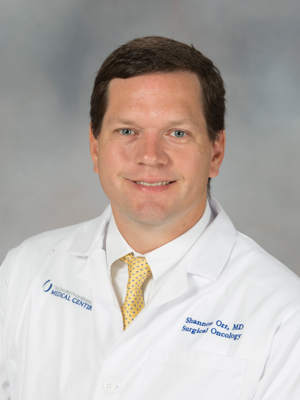Cancer Institute names Orr chair of Interdisciplinary GI program

Dr. John Ruckdeschel, University of Mississippi Medical Center Cancer Institute director, has named Dr. Shannon Orr chair of the interdisciplinary gastrointestinal cancer program.
Orr, assistant professor of surgical oncology in the UMMC Division of Transplant Surgery, specializes in gastrointestinal surgeries, including some procedures rarely needed such as cytoreductive surgery and hyperthermic intraperitoneal chemotherapy (HIPEC). In this procedure surgeons remove tumors from a person’s abdominal cavity, flood it with a chemotherapy solution, drain it and complete the surgery.
Orr’s leadership will help the program continue to improve what it can offer patients, said Ruckdeschel.
“Interdisciplinary programs are at the very core of what it means to be a true cancer center,” he said. “The development of a comprehensive care plan at the very beginning of a patient’s sojourn with us allows us as an institution to bring together the latest advances in therapy along with the addition of any new research approaches.”
As chairman of the interdisciplinary program, Orr will help guide treatment for UMMC patients with colorectal, gastric and pancreatic cancers. The team includes surgeons, medical and radiation oncologists, digestive disease specialists, radiologists, pathologists, nurses and clinical trial coordinators.
The team meets weekly to review new patients or those whose conditions have changed, to discuss and sometimes debate the best therapy practices for the patient’s primary doctor to recommend. Teams also try to coordinate visits so patients can have all testing and see specialists the same day.
Orr said he hopes to improve services and treatment by:
- Adding a geneticist to the team. “We’re looking forward to having them involved in our conferences.” A geneticist can “look at genetic syndromes that are becoming more prevalent than they have in the past.”
- Add a translational research factor to the team. A Cancer Institute researcher is already involved in some translational research and Orr said he hopes the team can help push that forward.
- Develop and/or find clinical trials that better fit the patient population. “We see a lot of metastatic disease at the time of diagnosis,” he said. “There may be no surgical benefit for these patients so we hope to find or tailor a trial for them.”
- Encouraging people to be screened. “I see so many patients that are in advanced stage of disease that could have had treatable, potentially curable disease,” he said. “Advancing colonoscopy and early detection is key to lowering deaths.


